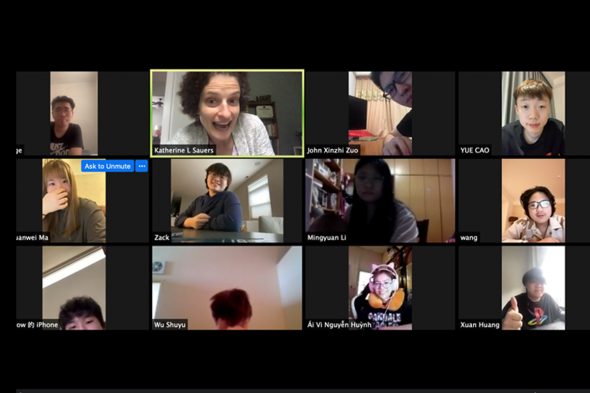Online learning helped English language instructor explore new ways of teaching

As Katie Sauers prepares for the upcoming Illinois Teachers of English to Speakers of Other Languages/Bilingual Education (ITBE) virtual conference, the University of Illinois Chicago lecturer shared part of her panel discussion, “Was Remote Learning so Bad? Lessons Learned.”
Sauers, who is a lecturer in the UIC Tutorium in Intensive English in the Office of Global Engagement, helps students learn English to achieve their academic, professional and personal goals. As someone who teaches intensive English language classes that depend on student interaction, she was not sure what would happen after the COVID -19 pandemic caused classes to go online.
“The thought of re-creating my classroom in an online environment seemed impossible and absolutely terrifying,” Sauers said.

To help her transition to an online format, she spent time organizing her class Blackboard site, which helped her focus. Once she did so, she was able to think about the most important elements of each lesson and make sure she addressed those during the class time she and her students had together.
Sauers found that it was challenging to get through as much content virtually compared with in-person. This required her to try and make the most effective use of the time she had with her students. Assignments that would normally be done in a class setting but could be effectively completed outside of the class time were relegated to homework assignments.
“Thinking through what I absolutely needed to be present for really helped me with planning,” Sauers said. “I think this will keep influencing my teaching long after we go back to campus.”
In addition, she also would like to continue having writing workshops with her students on Zoom, which she currently does using Google docs. This allowed her to schedule students for individual sessions where they could analyze essays together, which was more conducive to giving and receiving immediate feedback. She also said using a website called Flipgrid allowed her students to record final presentations, respond to class discussion threads and receive tailored pronunciation feedback.

Overall, she said the shift to online learning allowed her to look at the way she had been teaching in new ways. She said initially she found herself being very structured in her planning but quickly realized that she had become too rigid and had taken control away from the students themselves. When she decided to give control back to the students to negotiate their own learning and to try new ways to teach, “it felt like being a new teacher all over again.”
“It was a coping strategy because I had no control,” Sauers said. “However, this started to impact my classes because I think students felt they could just sit back and watch, which isn’t going to work in a language classroom.”
Among the things she likes about online learning and teaching is in many ways it is easier to give individual attention to students. She can schedule workshop hours with students through Zoom where they can conference with her about their writing or speech assignments, which feel more “immediate and efficient” online.
While building rapport is difficult in an online classroom, when the pandemic forced everyone online she felt students and teachers alike were in the same circumstances. This shared experience allowed the wall separating teachers and students to drop somewhat as people were invited into each other’s homes and were able to share light-hearted moments like experiencing each other’s pets virtually.
She offered the following tips:
- Be organized: Having a clear and consistent plan for your lesson/class will help everyone focus.
- Be flexible: This is true in any classroom. Ideas will not always work, so be ready to completely abandon the plan.
- Have fun: Allow unscripted moments to happen. Sometimes we focus so much on what needs to get accomplished that we forget people need time to process – teachers and students both.
- Give up control: Allow the students to be in charge. Students come alive when they are calling the shots a little.
- Be patient with yourself: This is for teachers and students. Online classes are not going to be just like in-person instruction so give yourself a break.
“I think this experience reminded me that it is important to be flexible and give up some control in the classroom,” she said. “I think the benefit of this online experience is that it made me remember how important it is to try new things.”
Categories
Topics
Office of Global Engagement, online learning, students, Tutorium in Intensive English
